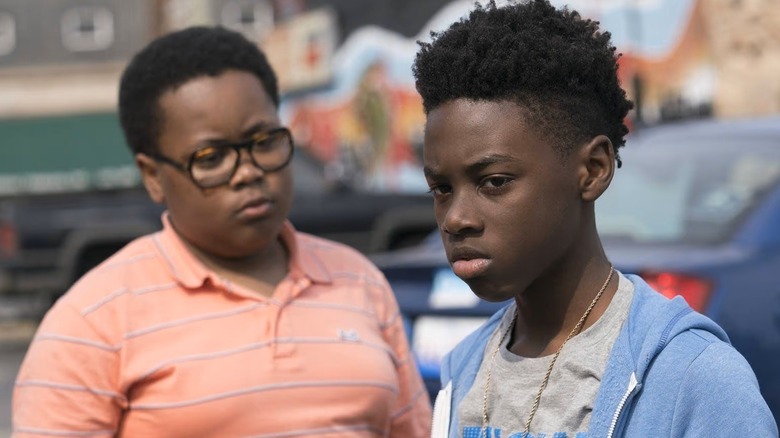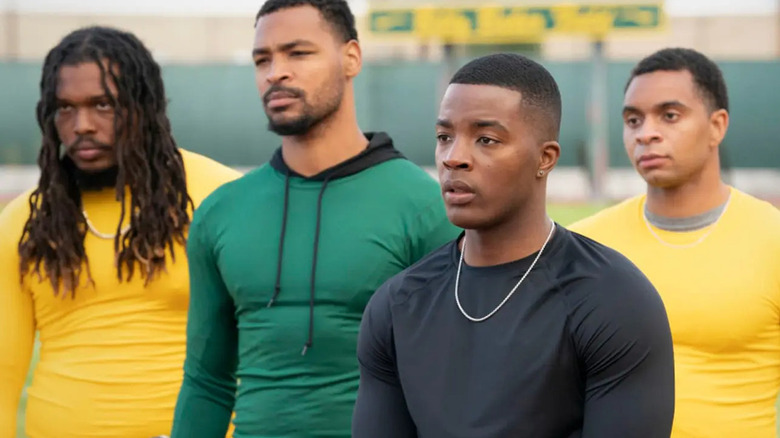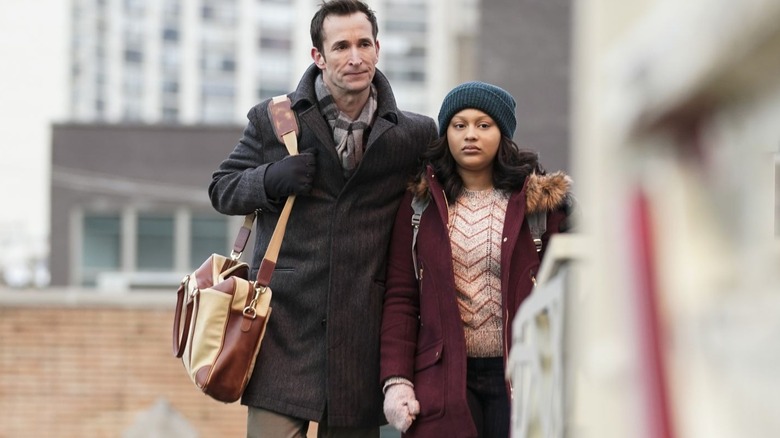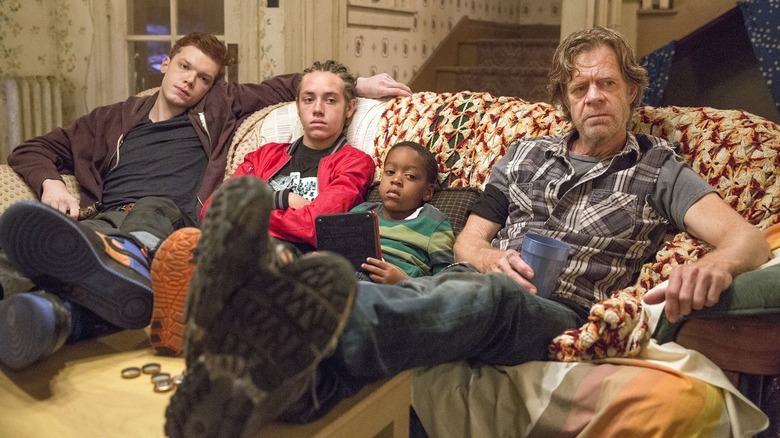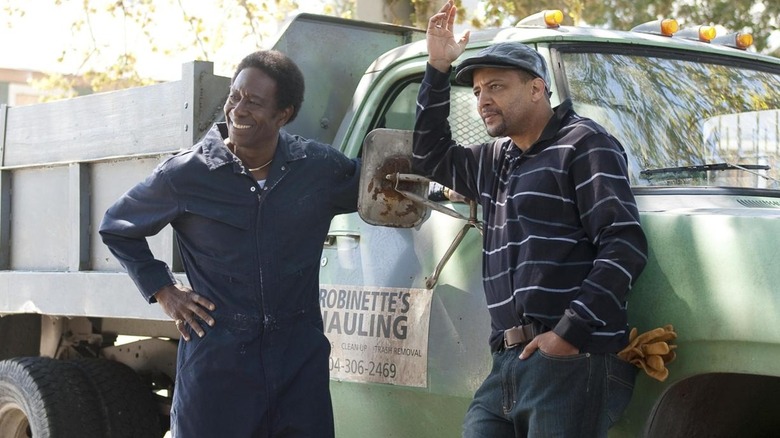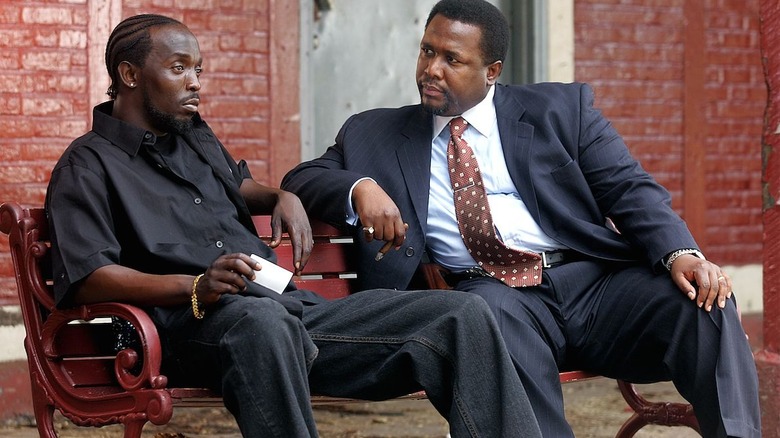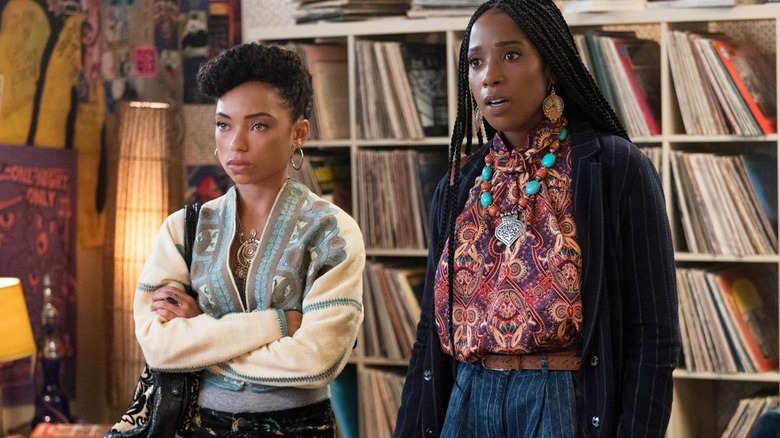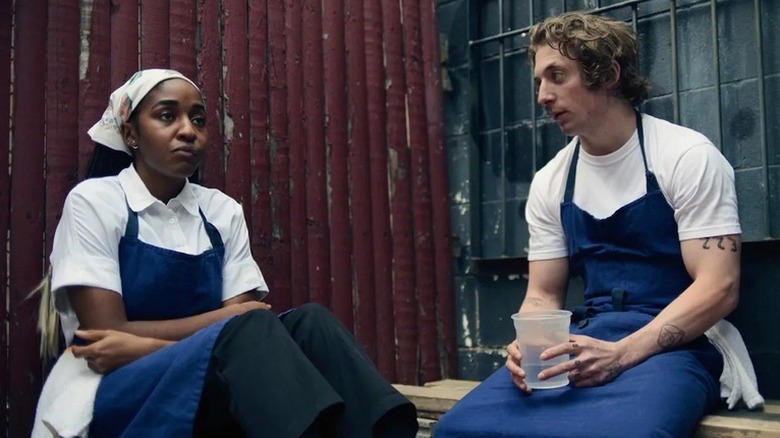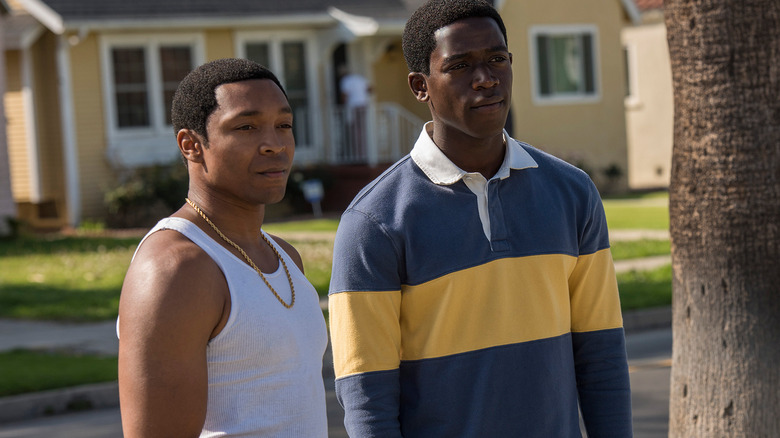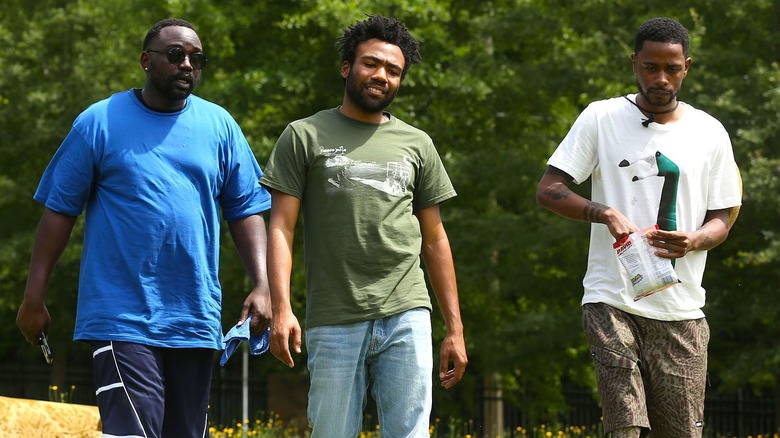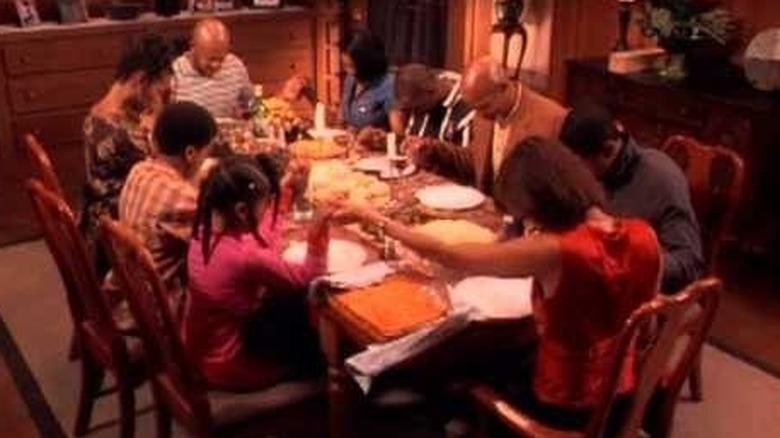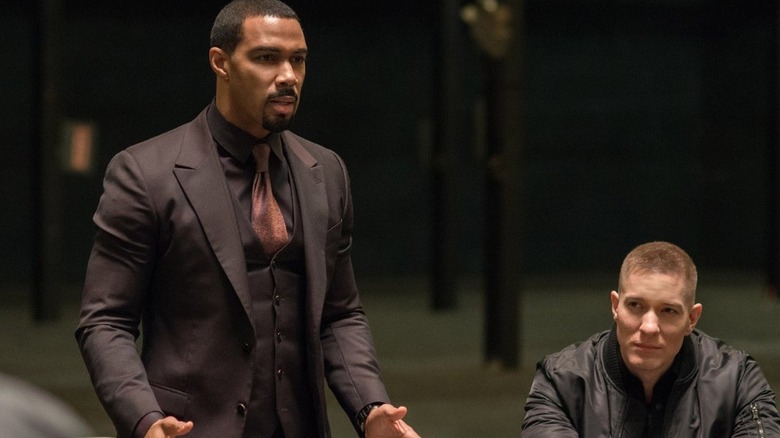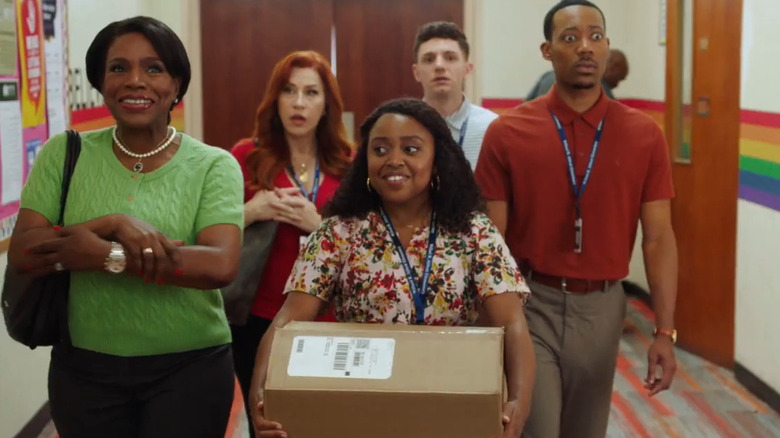12 Best TV Shows Like The Chi
Premiering on Showtime in 2018, "The Chi" is a drama series set in the city of Chicago that focuses primarily on a specific community as it deals with tragedy, triumph, and everything in between. The size of the ensemble has fluctuated a bit across the show's seven seasons thus far, but there is a main core of a half-dozen or so characters from which the majority of storylines and vents branch out.
The culture of Chicago itself is heavily ingrained in "The Chi," thanks in no small part to creator Lena Waithe being born and raised there, as well as noted native Chicagoan rapper and actor Common serving as one of the show's executive producers. With this in mind, recommending other Chicago-based shows is the most obvious route to go when exploring similar works to "The Chi." But there are also shows that are just as much love letters to their own city settings as "The Chi" is to Chicago, and those should also be in the discussion.
Apart from that, fans of "The Chi" will also likely want to check out other shows that feature predominantly Black casts, and are focused on both the challenges that Black communities face and the way that they're often so great at coming together when they're needed the most.
All-American
Loosely based on the life of NFL player Spencer Paysinger — specifically, his time as a high school football player — the CW's "All-American" earned rave reviews from critics when it debuted in the fall of 2018. The show's version of Spencer (Daniel Ezra) is a South Los Angeles high school student and football player who is offered the chance to attend and play for Beverly Hills High School instead. After accepting the offer, Spencer has to navigate life in a very different neighborhood and around very different people from where he grew up, while trying not to get distracted from his goal of playing in the NFL.
As for how the inspiration for "All-American," Spencer Paysinger, feels about the show, the now-retired linebacker is very proud of the series and the praise it has received. He points out that there seems to be a "high school phenom show" once or twice per generation, and believes "All-American" to be the most recent example of such a program. In a mini-review of the series for TV Insider, Matt Roush wrote, "Unlike so many of his CW brethren, Spencer is no superhero, but he's definitely worth rooting for."
At press time, "All-American" has seven seasons under its belt and has been renewed for one more season. A three-season spin-off called "All-American: Homecoming" ran between 2022 and 2024, featuring a few side characters from the original show as they attend college in Atlanta.
The Red Line
If you ever wondered what happened to Noah Wyle between "ER" and "The Pitt," the actor eventually returned to Chicago — where "ER" was also set and partially filmed — for the 2019 limited series "The Red Line." In the show, Wylie plays the husband of a Black man who is mistakenly shot and killed by a white police officer, leaving him a single father. The incident brings three families into each other's orbits as they try and find a way to heal, both separately and together, from the racial and socioeconomical tensions that would normally have them at odds.
Though it was always marketed as a limited series, the door was still open for "The Red Line" to come back for at least one more season, but those hopes were dashed when ratings for Season 1 were weak. The show is still worth seeking out, and its finale did provided a clearly-defined ending for all of the major characters in terms of the events of Season 1, even if there was still more stories that could have been told for them.
Shameless
Among the biggest differences between Showtime's "Shameless" and the original series of the same name was the former's Chicago setting, which moved things over from Manchester, England. The change wasn't just superficial either, as Chicago — specifically, the area of the city's south side known as Back of the Yards — is very much a character on the show. Indeed, the schemes of listless con man Frank Gallagher (William H. Macy) are explicitly tailored to the streets that he's been running around in for decades, as evidenced by how quickly he finds himself helpless any time he happens to venture too far outside his stomping grounds.
The family of whom Frank is the largely absent patriarch consists of children Fiona (Emmy Rossum), Lip (Jeremy Allen White), Carl (Ethan Cutkosky), Debbie (Emma Kenney), and Liam (Christian Isaiah), who are forced to take care of one another and make ends meet with virtually no help from their dad — and in fact, he's typically just a burden when he does come around. The Gallagher kids have been dealt a bad hand, and are not in a particularly ideal place for that, but they still tend to stick together and make it work.
Both the Gallaghers and their various friends and neighbors know that all they've got is each other, and nobody outside of their neighborhood gives a damn about them — so they pull together and look out for one another.
Treme
Despite what a significant event Hurricane Katrina was when it hit in 2005, and how many countless lives were affected and continue to be affected, few non-documentary films or television shows have bothered to tackle the subject. That fact alone makes HBO's "Treme" special by default, as it does exactly that — it picks up three months after Katrina and follows various residents of New Orleans as they take on the seemingly impossible task of rebuilding not only their individual lives, but the city's culture and spirit as a whole.
Its uniqueness aside, "Treme" would have still been worth talking about and recommending even if had been one of a dozen shows about New Orleans post-Katrina. In fact, local New Orleans newspaper The Times-Picayune not only praised the show's depiction of the aftermath of Katrina, but its representation of the city as a whole, proclaiming, "This is the screen depiction that New Orleans deserves, has always desired, but has been denied."
While it's definitely not a competition as to which city and its people have had it the worst, few cities can claim to have dealt with anything on the level of Hurricane Katrina. The fact that the residents of New Orleans found it within themselves to not only rebuild but to laugh again, celebrate again, and play music again is a testament to just how powerful a community's heart and ambition can be. And "Treme" is an excellent depiction of that.
The Wire
"The Wire" is considered one of the best TV shows of all time, period, so people should check it out regardless of any similarities to any other show. But while the highly acclaimed crime drama tells stories that the underprivileged residents and the people of color in any number of major U.S. cities can relate to, "The Wire" is also very much a show about Baltimore. The show's creator, David Simon, was a Baltimore journalist who mainly reported on and wrote about the city's crime as well as its police department, and spent some time embedded within the Baltimore Police Department's homicide unit.
The book he wrote about those experiences served as the basis for the NBC series "Homicide: Life on the Street," but Simon was much more directly involved with creating, writing, and producing "The Wire." It obviously has a greater focus on the crime element — and that element's relationship to law enforcement — than "The Chi" does, but both shows definitely share a lot of similarities in that regard. It's especially evident in the way that it becomes crucial whether or not a community can hang together and support its own, even when members of that community might not be making the best choices.
Dear White People
Shows about Black people and Black communities shouldn't only be watched by Black viewers. White people can learn a lot from a show like "The Chi," as it offers them a window into a world that they might not see that often — particularly not an unfiltered view that comes from the inside looking out. Netflix's "Dear White People" specifically makes that pronouncement in its title, as the show follows a group of Black students trying to be the voices for the betterment of race relations and a more progressive culture overall at an Ivy League college.
"Dear White People," however, also has a more direct connection to "The Chi" than any other show on this list. The original film of the same name on which the show is based was produced by Lena Waithe, creator of "The Chi." Waithe also played the recurring character P. Ninny in "Dear White People," just as she's also Camille Hallaway in two episodes of "The Chi." Waithe also created the series "Boomerang" and "Twenties," and won an Emmy for her writing work on "Master of None."
The Bear
Other than "The Chi" and the shows of NBC's One Chicago universe, there perhaps hasn't been anything more inherently Chicago on television this decade than "The Bear." Beyond the accents, the slang, and the trademark Chicago dish — Italian beef sandwiches — that serves as the signature item of the restaurant the show is initially built around, "The Bear" captures the city's famous sense of community and the way Chicagoans take the preparation and sharing of food extremely seriously.
Chicago is also unique in the way that hole-in-the-wall grease pits and five-star restaurants seamlessly co-exist, and are not only patronized but often also run by the exact same people. That dynamic serves as the main crux of "The Bear," as chefs Carm (Jeremy Allen White) and Syd (Ayo Edebiri) work to upgrade a fledgling neighborhood sandwich joint into a hipster haven but without losing the spirit or clientele of the original. The fact that they have staffed the place with all the same locals who worked at the previous incarnation is a testament to that aim, even if it often means significant culture clashes.
Though he is positioned as the show's main protagonist, some have made the argument that "The Bear" is better off without Carm, particularly with all that happened in Season 3. But in a lot of ways, this speaks more to how compelling the show's entire ensemble is than it does to Carm himself being a weak or unnecessary character.
Snowfall
What makes the FX drama series "Snowfall" a good recommendation for fans of "The Chi" is actually its similarities to two of the previous recommendations on this list. Like "Treme," "Snowfall" is a look back at a previous era, one where a significant real-life tragedy occurred — in this case, the crack epidemic that swept Black communities in Los Angeles in the 1980s. And like "The Wire," "Snowfall" is technically a story about criminals, but it understands that the choice of whether or not to commit illegal acts isn't always an easy one and is heavily influenced by institutional racism and dire circumstances.
Among the major players in "Snowfall" are the local crack dealers and their customers; the members of the cartels that supply the dealers; the law enforcement trying to maintain control; and the families affected by all of them. The series has an impressive legacy behind it as well, as the first television show co-created by John Singleton, the director who helped to pioneer the Los Angeles "hood" film genre with "Boyz n the Hood," "Poetic Justice," and "Baby Boy."
Atlanta
After making a name for himself as Troy on "Community" and rapping under the stage name Childish Gambino, Donald Glover took his creative output to the next level when he created the dramedy series "Atlanta." Initially, the show focused on up-and-coming rapper Paper Boi (Brian Tyree Henry), with Glover playing Paper Boi's cousin and manager, Earn. But it didn't take long before it was made clear that "Atlanta" was going to be about a lot more than that — and that it wasn't afraid to get weird. In fact, the show got so surreal and cerebral by the fourth and final season that "Atlanta" fans were comparing the series finale to the movie "Inception." Even the show's namesake city had completely ceased to be important after a certain point.
At its core, "Atlanta" never stopped being about the lives of Black people and the way that white society seems intent to make things as difficult as possible for Black people to succeed — especially the moment Black people are no longer making money for white people and playing by white people's rules. Glover also wasn't afraid to take on sacred cows of his own community, with an entire episode that was very much a condemnation of Michael Jackson and his various, shall we say, eccentricities — even though the show was smart to never come right out and say that Jackson was the target.
Soul Food
Though the "Soul Food" movie is a lot more well-known than the "Soul Food" TV show — and that divide has grown even larger as time has gone on — the show still deserves props for being an underrated gem in its own right. It's also another Chicago-based series, which is an obvious bonus for this particular list. Running for four seasons on Showtime between 2000 and 2004, "Soul Food" continues the events of the film, though seeing or remembering the movie isn't especially necessary to enjoy the show.
All that you need to enjoy "Soul Food" is to understand just how important family dinners can be for Black families, who do all they can to make the breaking of bread together a regular occurrence rather than something that's only saved for holidays and funerals. They gather in the kitchen as the food is prepared, sit around a large table to eat the food together, and then relax in the living room with full bellies, all the while sharing stories, airing grievances, and otherwise keeping those important lines of honest communication open. "Soul Food" is a beautiful depiction of that ritual, and is worth seeking out and watching even all these years later.
Power
Up until now, there has been a certain amount of substance to the shows on this list, just like "The Chi" has. But "The Chi" isn't always about messages and lessons — sometimes, it's just entertaining for the sake of being entertaining. For those who want to turn their brains off to an extent and just watch a show with action and drama that never really rises above popcorn levels in those regards, "Power" is very much that show. As Variety described "Power" in its review, "this is undemanding escapism with all the requisite pay-TV trappings."
James "Ghost" St. Patrick (Omari Hardwick) is trying to transition away from drug dealing and into the nightclub business, though the money and the spoils of the former prove tough to leave behind. His various professional and personal relationships are no less complicated, as evidenced by his romantic entanglement with a childhood flame (Lela Loren) who just so happens to be a federal prosecutor. Producer Curtis "50 Cent" Jackson plays a small role, though it was his clout and his marketing of "Power" that helped it reach a large enough audience to last six seasons, along with three spin-offs and counting.
Abbott Elementary
Last but not least, and perhaps an even more stark standout on this list, is "Abbott Elementary" — the only straight-up sitcom among these recommendations. Half-hour network sitcoms and hourlong cable dramas are typically not in the same creative ballpark as one another, but the argument can be made that "Abbott Elementary" and "The Chi" actually have quite a lot in common.
For starters, "Abbott" is as much a love letter to Philadelphia and its Black communities as "The Chi" is to Chicago and its own demographic. The main protagonists of "Abbott" are technically the teachers and other adult members of the school's and district's staff, but the students and the surrounding community are always right there on the periphery. It's technically a workplace mockumentary in the style of "The Office" or "Parks and Recreation," but it's arguably more so the story of an underfunded school in a struggling neighborhood, staffed by people who truly believe in doing everything they can to help their kids rise above the many roadblocks that have been and will continue to be put in their path.
A big part of the reason why "Abbott Elementary" works is thanks to some heartfelt inspiration — creator Quinta Brunson based the show on her own mother's experiences as a teacher in Philadelphia, and she also named the show's titular school after one of her own childhood teachers, Mrs. Abbott.
